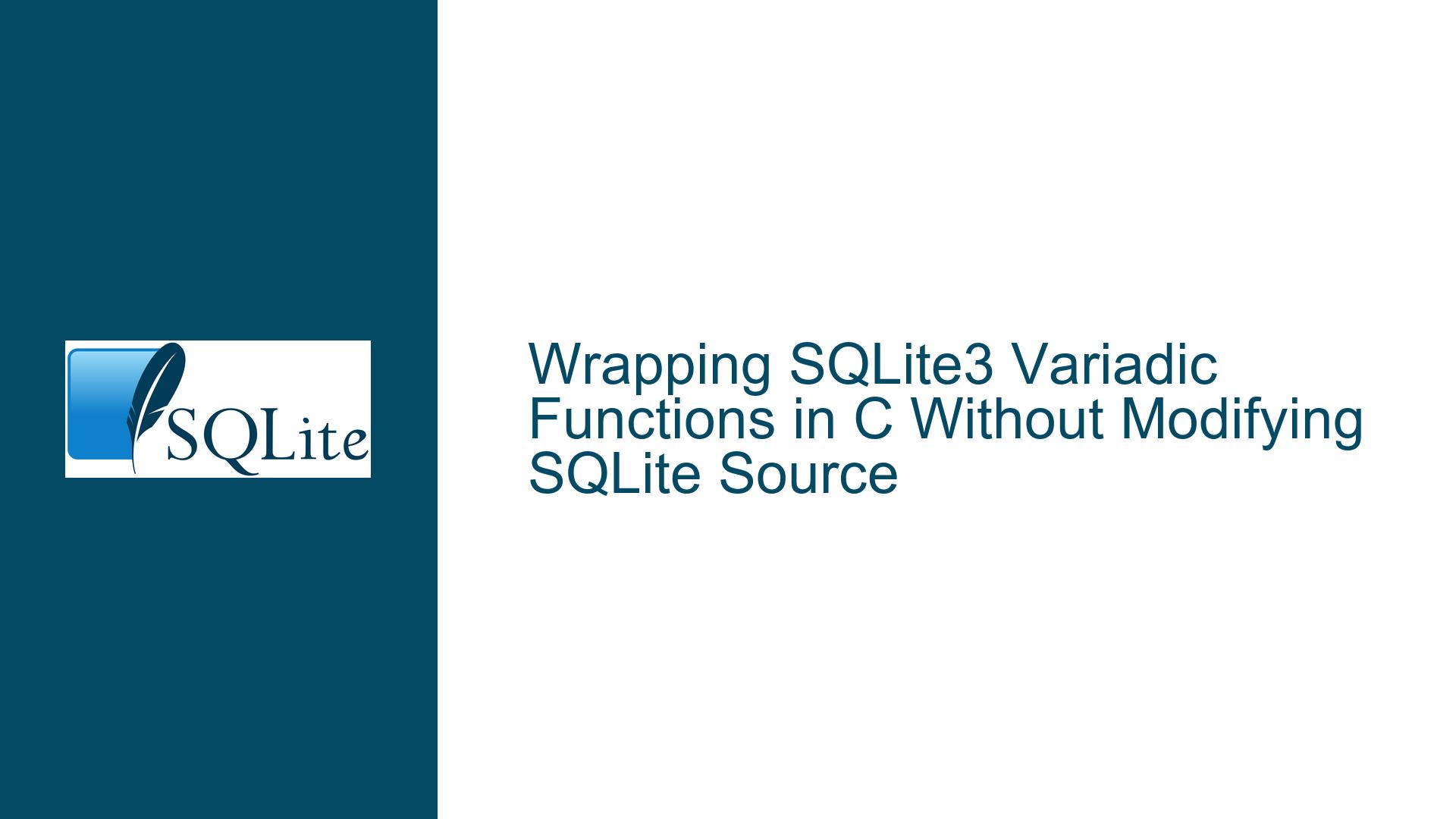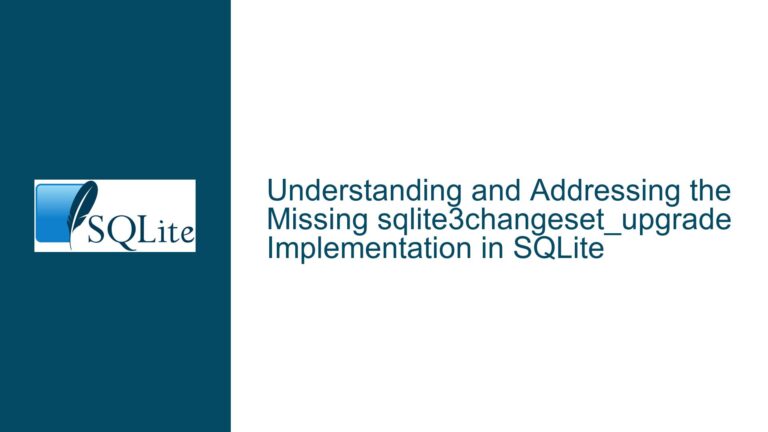Wrapping SQLite3 Variadic Functions in C Without Modifying SQLite Source
Understanding the Challenge of Wrapping SQLite3’s Variadic Functions
SQLite3’s sqlite3_config function is a variadic function, meaning it accepts a variable number of arguments. This flexibility is powerful in C but poses significant challenges when attempting to create a wrapper around it. The core issue lies in the nature of variadic functions in C, which do not provide a straightforward way to forward their arguments to another function without explicitly defining the argument types and counts. This limitation becomes particularly problematic when trying to implement custom error handling or default behaviors in a wrapper without modifying the SQLite3 source code.
The sqlite3_config function is used to configure global SQLite settings, and its variadic nature allows it to handle a wide range of configuration options, each requiring different argument types and counts. For example, some options may require an integer, while others may need a pointer or a combination of both. This variability makes it impossible to create a single, generic wrapper that can handle all possible configurations without resorting to complex and potentially fragile workarounds.
Why Direct Wrapping of Variadic Functions is Problematic
The primary obstacle in wrapping sqlite3_config is the lack of a va_list version of the function. In C, variadic functions typically come in pairs: one that accepts a variable number of arguments directly (e.g., sqlite3_config(int op, ...)) and another that accepts a va_list (e.g., sqlite3_config_v(int op, va_list ap)). The latter allows for easier forwarding of arguments, as the va_list can be passed around and manipulated. However, SQLite3 does not provide a va_list version of sqlite3_config, making it impossible to directly forward the arguments from a wrapper function.
Without a va_list version, the only way to wrap sqlite3_config is to manually handle each possible combination of arguments. This approach is not only tedious but also error-prone, as it requires anticipating every possible configuration option and its corresponding argument types. Additionally, it limits the flexibility of the wrapper, as any new configuration options added in future versions of SQLite3 would require updates to the wrapper.
Strategies for Wrapping SQLite3 Variadic Functions Without Modifying SQLite Source
Given the constraints, there are several strategies to create a functional wrapper around sqlite3_config without modifying the SQLite3 source code. These strategies involve leveraging C preprocessor macros, creating overloaded functions for specific argument combinations, and using advanced compiler features like statement expressions.
Using Preprocessor Macros for Argument Forwarding
One approach is to use preprocessor macros to forward the arguments to sqlite3_config. This method relies on the __VA_ARGS__ feature of the C preprocessor, which allows macros to accept a variable number of arguments. For example, a macro can be defined to call sqlite3_config and then handle the error code in a custom way:
#define err_config_wrapper(...) \
convert_sqlite_error_to_my_type(sqlite3_config(__VA_ARGS__))
This macro forwards all arguments to sqlite3_config and then converts the resulting error code to a custom error type. While this approach is simple and avoids the need for a va_list version of the function, it has limitations. Specifically, it does not allow for complex error handling or additional logic to be inserted between the call to sqlite3_config and the error conversion.
Overloading Functions for Specific Argument Combinations
Another strategy is to create a set of overloaded functions, each handling a specific combination of arguments. This approach is more labor-intensive but provides greater flexibility and control over the wrapping process. For example, separate functions can be defined for each configuration option:
int config_single_int(int op, int value) {
int rc = sqlite3_config(op, value);
if (rc != SQLITE_OK) {
handle_error(rc);
}
return rc;
}
int config_double_int(int op, int value1, int value2) {
int rc = sqlite3_config(op, value1, value2);
if (rc != SQLITE_OK) {
handle_error(rc);
}
return rc;
}
These functions explicitly define the argument types and counts for each configuration option, allowing for custom error handling and additional logic. However, this approach requires anticipating all possible configuration options and their argument types, which can be impractical for large or evolving APIs like SQLite3.
Leveraging Statement Expressions for Advanced Wrapping
For more sophisticated error handling and logic, statement expressions can be used. Statement expressions are a GCC extension that allows a block of code to be treated as an expression. This feature can be used to create a macro that not only forwards arguments to sqlite3_config but also performs custom error handling:
#define err_config_wrapper(...) ({ \
int rc = sqlite3_config(__VA_ARGS__); \
MyErrorStruct *err = NULL; \
if (rc != SQLITE_OK) { \
err = allocate_error(rc, __LINE__, __func__, __FILE__, #__VA_ARGS__, "sqlite3_config"); \
log_error(err); \
call_alternative(err, __VA_ARGS__); \
} \
err; \
})
This macro forwards the arguments to sqlite3_config, checks the return code, and performs custom error handling if necessary. The use of statement expressions allows for complex logic to be embedded within the macro, making it a powerful tool for wrapping variadic functions. However, this approach is not portable, as statement expressions are not part of the standard C language and are only supported by certain compilers like GCC.
Conclusion: Balancing Flexibility and Complexity in Wrapping Variadic Functions
Wrapping SQLite3’s variadic functions like sqlite3_config presents a unique set of challenges due to the limitations of the C language and the lack of a va_list version of the function. While it is impossible to create a completely generic wrapper that handles all possible configurations, several strategies can be employed to achieve a functional and flexible solution.
Preprocessor macros offer a simple way to forward arguments and handle errors, but they lack the flexibility for more complex logic. Overloading functions for specific argument combinations provides greater control but requires significant upfront effort and maintenance. Statement expressions, while powerful, are not portable and should be used with caution.
Ultimately, the choice of strategy depends on the specific requirements of the wrapper and the constraints of the target environment. By carefully considering these factors and leveraging the appropriate techniques, it is possible to create a robust and maintainable wrapper around SQLite3’s variadic functions without modifying the SQLite source code.






